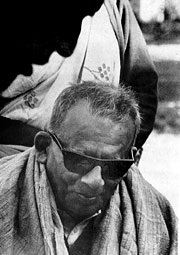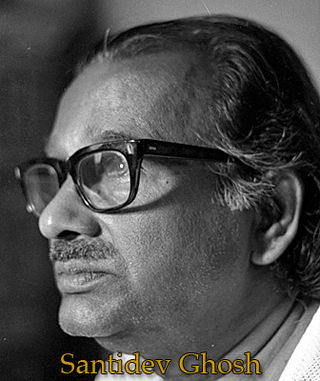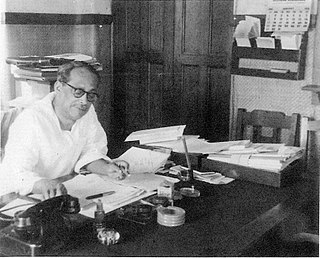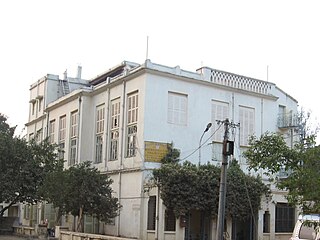Related Research Articles

Shantiniketan is a neighbourhood of Bolpur town in the Bolpur subdivision of Birbhum district in West Bengal, India, approximately 152 km north of Kolkata. It was established by Maharshi Devendranath Tagore, and later expanded by his son, Rabindranath Tagore whose vision became what is now a university town with the creation of Visva-Bharati.

Visva-Bharati is a public central university and an Institution of National Importance located in Shantiniketan, West Bengal, India. It was founded by Gurudev Rabindranath Tagore who called it Visva-Bharati, which means the communion of the world with India. Until independence it was a college. Soon after independence, the institution was given the status of a central university in 1951 by an act of the Parliament.

Bolpur is a city and a municipality in Birbhum district in the state of West Bengal, India. It is the headquarters of the Bolpur subdivision. Bolpur municipal area includes Santiniketan, Sriniketan and Prantik. The city is known as a Cultural and Educational hub of West Bengal. The city is under the Jurisdiction of Bolpur and Santiniketan Police station. Bolpur is the largest and most populous city in Birbhum district and 28th most populous city in West Bengal. Located on the banks of Ajay River and Kopai (Sal) River, Bolpur has been a major Human settlement. It is 150 km north of Kolkata and is famous for Visva Bharati, the University set up by the Nobel laureate poet Rabindranath Tagore.

Suchitra Mitra was an Indian singer, composer, artist exponent of Rabindra Sangeet or the songs of Bengal's poet laureate Rabindranath Tagore, professor, and the first woman Sheriff of Kolkata. As an academic, she remained a professor and the Head of Rabindra Sangeet Department at the Rabindra Bharati University for many years. Mitra was a playback singer in Bengali films and was associated for many years with the Indian People's Theatre Association.

Benode Behari Mukherjee was an Indian artist from West Bengal state. Mukherjee was one of the pioneers of Indian modern art and a key figure of Contextual Modernism. He was one of the earliest artists in modern India to take up to murals as a mode of artistic expression. All his murals depict a subtle understanding of environmental through pioneering architectural nuances.

Santidev Ghose was an Indian author, singer, actor, dancer and maestro of Rabindra Sangeet.
Sriniketan is a neighbourhood of Surul in Bolpur subdivision of Birbhum district in the Indian state of West Bengal. It is adjacent to Santiniketan and houses the second campus of Visva-Bharati University. The Palli Samgathana Vibhag and Palli Siksha Bhavana are located in west bengal

Prabodh Chandra Bagchi or P. C. Bagchi was one of the most notable Sino -Indologists of the 20th century. He was the third Upacharya (Vice-Chancellor) of Visva-Bharati University.

Kala Bhavana is the fine arts faculty of Visva-Bharati University, in Shantiniketan, India. It is an institution of education and research in visual arts, founded in 1919, it was established by Nobel laureate Rabindranath Tagore.
Siksha Satra is a school at Sriniketan town in Birbhum district, West Bengal. Established in 1924, it functions under Visva Bharati University.

Pratima Devi (1893–1969) was an Indian Bengali artist, widely known for her artistic abilities. She was wife of Rathindranath Tagore. The poet took special interest in developing her capabilities.

Swapan Kumar Datta is a (Professor) of rice biotechnology who focuses on genetic engineering of Indica rice. Datta has demonstrated the development of genetically engineered Indica rice from protoplast derived from haploid embryogenic cell suspension culture. Golden Indica Rice with enriched Provitamin A and Ferritin rice with high iron content were developed by his group with a vision to meet the challenges of malnutrition in developing countries. Datta has been named as one among the top 25 Indian scientists from all fields of science by India Today.
The following is a list of notable people associated withVisva- Bharati University and/or Santiniketan, a neighbourhood in Bolpur city in West Bengal, India:
Prabhat Kumar Mukhopadhyaya was a Bengali writer best known for his biography of Rabindranath Tagore.
Sailajaranjan Majumdar was a distinguished exponent and teacher of Rabindra Sangeet.

Cheena Bhavana, of Visva-Bharati University, founded in 1937, is a centre of Sino-Indian cultural studies located at Santiniketan in West Bengal, India. Its reputation as a center promoting historical study and modern relations between the two countries was built by such figures as Rabindranath Tagore and Tan Yun-Shan. The library is known for a major collection of Chinese books and journals, especially Buddhist scriptures and texts.
Tan Yun-Shan was a Chinese scholar and founder of Santiniketan's Cheena Bhavana, the oldest centre of Chinese studies in South Asia. He devoted his life to the cause of Sino-Indian cultural friendship.

Sangit Bhavana, of Visva-Bharati University, Santiniketan, started functioning as a part of Kala Bhavana in 1919 and as a separate institution in 1933. It was established by the Nobel laureate Rabindranath Tagore.

Palli Samgathana Vibhaga, of Visva-Bharati University, was established at Sriniketan in 1922, by the Nobel laureate Rabindranath Tagore. Leonard Knight Elmhirst was its first director.

Jamuna Sen was an Indian artist, known for her design work in a variety of mediums including Batik and Alpona as well as developing, in an Indian context, a variety of traditional crafts from across the world. She was a pioneer in establishing the practice of Batik in India in modern times. Daughter of Nandalal Bose, a central figure in modern Indian art, she was brought up in the artistic and intellectual milieu of Santiniketan and made significant contributions in the field of design.
References
- ↑ Some Alumni of Scottish Church College in 175th Year Commemoration Volume. Scottish Church College, April 2008. page 589
- ↑ "Pathabhavan Praktoni News | GOURGOPAL GHOSH". Archived from the original on 24 August 2011. Retrieved 12 May 2011.
